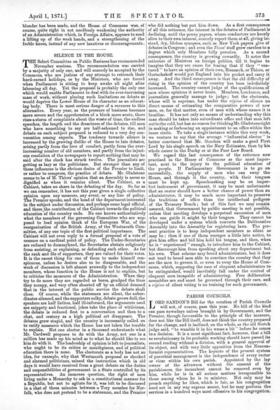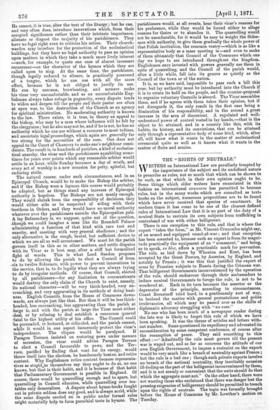PARISH COUNCILS.
y ORD BANDON'S Bill for the creation of Parish Councils. .1.2 will not, of course, pass this year. No bill of the kind can pass nowadays unless brought in by Government, and the Premier, though favourable to the principle of the measure, does not like the Bill itself, does not think the country prepared for the change, and is inclined, on the whole, as the old Scotch judge said, "to wamble it in his wame a bit" before he comes to a decision. It is a most significant fact, however, that a bill so revolutionary in its probable working should have passed its second reading without a division, with a general approval of its object, and with very little opposition from the Noncon- formist representatives. The keynote of the present system of parochial management is the independence of every rector or vicar within his own parish. Appointed by the lay owner of the advowson without the consent of the parishioners, the incumbent cannot be removed even by him, while he is in all serious matters irresponsible to those among whom he is to minister. Not only may he preach anything he likes, which is fair, as his congregation need not in any way express assent, but he may perform the services in a hundred ways most offensive to his congregation.
He cannot, it is true, alter the text of the liturgy ; but he can, and very often does, introduce innovations which, from their accepted significance rather than their intrinsic importance, alienate or disgust the majority of his parishioners. They have no legal right even to criticize his action. Their church- warden may interfere for the protection of the ecclesiastical buildings, but they have no legal authority to pass an opinion upon matters in which they take a much more lively interest —such, for example, to quote one case of almost incessant recurrence—as the character of the hymns which they are called upon to sing. At the same time, the parishioner, though legally reduced to silence, is practically possessed of a tongue, which he can use with all the more effect, because he is not obliged to justify its use. He can by sarcasm, browbeating, and menace make his vicar very uncomfortable, and as an uncomfortable Eng- lishman always takes refuge in pugnacity, every dispute tends to widen and deepen till the people and their pastor are often at open war, to the destruction of the Church as an agency for spiritual ministration. No moderating authority is known to the law. There exists, it is true, in theory an appeal to the bishop, who may be a man whose influence will be felt by the clergyman; but he also may not be, and if he is not, he has no authority which he can use without a recourse to most tedious, and uncertain legal proceedings, which again are generally far too strong for the necessities of the case. One does not appeal to the Court of Chancery to make one's neighbour consi- derate. The result is, in hundreds of parishes, a kind of ecclesias- tical anarchy, the vicar and the parishioners squabbling some- times for years over points which any reasonable arbiter would settle in an hour, while Sunday becomes a day of wrath, and every act of worship is a new occasion for petty, spiteful, but enduring strife.
The natural course, under such circumstances, and in an Episcopal Church, would be to make the Bishop the arbiter, and if the Bishop were a layman this course would probably be adopted, but as things stand any increase of Episcopal authority is hopeless. The Bishops are not manly enough. They would shrink from the responsibility of decisions, they -would either side or be suspected of siding with their 'brethren in Orders, and they would have no moral authority -whatever over the parishioners outside the Episcopalian pale. A lay Referendary is, we suppose, quite out of the question, .though we could imagine a man like Sir Roandell Palmer -administering a function of that kind with rare tact and suavity, and meeting with very general obedience ; and the • only alternative is the rough, brutal, but sufficient device to which we are all so well accustomed. We must let the parish .govern itself in this as in other matters, and settle disputes with its Vicar as it best may, after a stiff but formalized fight of words. This is what Lord Sandon proposes to do by allowing the parish to elect a Council of from :six to twelve Sidesmen, with power to prevent innovations in the service, that is, to do legally what they are always trying ,to do by irregular methods. Of course, that Council, elected by all parishioners—for any limitation to communicants -would destroy the only claim of the Church to exist, namely, its national character—will be very thick-headed, very en- croaching, and very aggravating in its methods of doing busi- ness. English Councils, from the House of Commons down- wards, are always just like that. But then it will be less thick- headed, less encroaching, less aggravating than the parish at large is, and with the parish at large the Vicar must either ..deal, or by refusing to deal establish a rancorous quarrel -fatal to the highest utility of his office. The Council could be persuaded, or lectured, or ridiculed, and the parish cannot, while it would in one aspect immensely protect the vicar's independence. The cliques would be paralyzed. If Paragon Terrace insisted on restoring pews under menace of secession, the vicar could advise Paragon Terrace to elect a Council favourable to pews, and the Ter- race, pacified by finding that vent for its energy, would throw itself into the election, be handsomely beaten, and retire .content. Why Englishmen retire content because representa- tives as stupid.as themselves say they ought to do so, no one knows, but that is their habit, and it is because of that habit that Parliamentary Government is possible in England. Of course, there would be quarrelling enough and to spare, but quarrelling in Council educates, while quarrelling over tea- tables only demoralizes. A dispute about hymn-books fought out in private seldom does any good, and is always acrid, while the same dispute carried on in public under formal rules might materially help to form parochial taste in hymns. The parishioners would, at all events, hear their vicar's reasons for his preference, while they would be forced either to allege reasons for theirs or to abandon it. The quarrelling would not be unendurable, for it would be easy to weight the Sides- men with authority, to give them gradually the whole power of that Polish institution, the common vestry—which is as like a representative body as a mass meeting is—and even to make of them ultimately that Council of the Commune which one day we hope to see introduced throughaut the kingdom. Englishmen once invested with powers generally use them in spite of quarrelling, and the Council of the parish would, alter a little while, fall into its groove as quietly as the Council of the town or of the nation.
It is, as we have said, impossible to pass such a bill this year, but lay authority must be introduced into the Church if it is to retain its hold on the people, and the counter-proposal to organize voluntary Councils is absurd. The Vicar assembles them, and if he agrees with them takes their opinion, but if not disregards it, the only result in the first case being a diminution of his responsibility, and in the second a great increase in the area of discontent. A regulated and well- understood power of control vested in lay hands,—that is the object to be attained, and in a country like this, with its habits, its history, and its convictions, that can be attained only through a representative body of some kind, which, after all, will know what it wants in the matter of ecclesiastical ceremonial quite as well as it knows what it wants in the matter of fleets and armies.

































 Previous page
Previous page